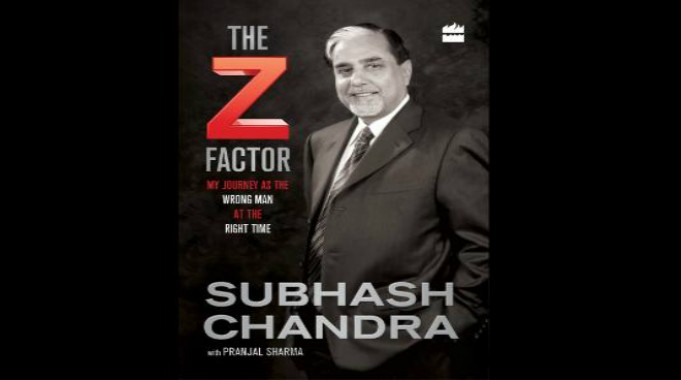Not a dull page
The best thing about picking up this book is that it is not what you would expect from a man who hosts a self-aggrandizing TV show on what life and business have taught him. The Subhash Chandra Show on the Zee channels is far from riveting. Chandra’s book however, is. He is India’s satellite TV pioneer, and his autobiography is the first personalized saga of the satellite expansion years in the nineteen nineties. Nobody in what is now a vast media entrepreneurship landscape has chronicled this before.
The portrait presented in The Z Factor is one of tenacity. The salt and pepper tycoon paints an endearing picture of himself. Candid, unafraid, always hands on, when success or survival is at stake. To the extent of personally driving around the city picking up staff to keep the channel going following the Mumbai blasts of 1993. Or living in a mobile van on-site when the Essel amusement park was being built.
He started out at age seventeen with Rs 17 in hand, in the business of processing grains and pulses. He describes hanging around grain mandis and Food Corporation of India godowns, mortifyingly aware of how the trade viewed his family and its failed business.
And it is riveting because the entrepreneur from Haryana who built the Zee empire has an unvarnished approach to telling his own story. Short chapters, simple language, and a motley collection of anecdotes. He is also given to breezy maligning, tact and discretion do not figure.
The result is a bare-all narration of how an empire was built, deals struck, compromises made. He is happy to tell you which politicians he tried to cultivate (Sanjay Gandhi, for one) and whom he bribed and for what. It sheds unflattering light on how Subhash Chandra viewed the men and women who worked for him, and the politicians and bureaucrats he had to work his way around. But since he is worth as much as he is, few are likely to want to take him to court. (Not even the Ambanis whose adulteration of petrol tankers his channel covered.) In fact some of those cheerfully maligned in his book, like Rajat Sharma whom he persuaded to give television a try, were at the book release at the prime minister’s residence, smiling indulgently at him.
The picture you get of the media business in the process of reading this autobiography tells you that the media part of it is incidental. To succeed the instinct for survival in business has to be a well honed one.
You have to be shrewd, thick skinned, and a survivor. “I am not scared of jumping into situations which would scare others. I do not fear anything. That is the legacy of my Dadaji. He would say death comes once. Why be scared of something which comes only once.”
The exception was encountering Indira Gandhi. When he found he would have to meet her, he says, he thought he would pee in his pants. Great stories here of negotiating export commissions with the Gandhi family coterie, including Dhirendra Brahmachari, once the rice trade with the Soviet Union had opened up.
Ultimately Chandra, the social outsider, became the one who succeeded in television because he build a variety of business where there was cash to fall back on when media stocks lost value. Bare knuckles instincts honed in Haryana grain mandis take you further than Doon School connections to the Gandhis and others, if you want to compare the Zee empire’s finances today with NDTV’s, for instance.
Chandra lost 90 per cent of the value of his media business in 2000 as the Zee stock skyrocketed and then crashed. Stockbroker Ketan Parekh figures in this part of the story. The author's takeaway from that episode: never buy or sell your own share because you think it is undervalued or overvalued. It took five years for stability to return he says, and led him to the realisation that the group needed some diversification to spread the risk for the future. And that led him to enter the infrastructure sector where he is today. He is an industrialist who is also a media tycoon. And that sets him apart from almost everybody else who is succeeding in this sector, not counting the Ambanis.
There is the occasional glimpse into the journalistic world which sits in judgment on everyone else. The prime ministerial hopeful in the weeks before elections (Atal Bihari Vajpayee) shys away from appearing on ‘Aap ki Adalat’ because he is afraid of two questions he might be asked. Rajat Sharma is dealt with, the questions are not asked. Appearing on the show, according to Chandra, does wonders for Vajpayee success in the elections which follow.
And then there is the “Stabbed in the Back” chapter which is Chandra’s injured-sounding version of the fight with Naveen Jindal over Zee’s expose of the coal scam. While Jindal did a sting of what he called a blackmail operation by Zee News to do an advertising deal in return for calling off the news investigation into how Jindal got his coal blocks, Chandra claims here that the talk of an advertising contract that Jindal got recorded was actually an entrapment that Zee had planned to expose Jindal.
Those of us who have tracked Mr Chandra and his empire since 1992 know of a few tales that he has judiciously omitted from this saga. But there is enough masala that he has left in.
The Z Factor is published by Harper Collins
